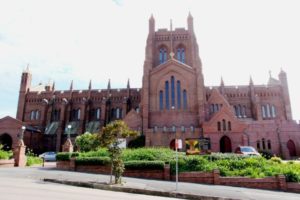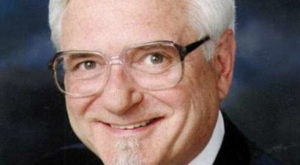 About 30 years ago, a clergyman was describing to me his arrival in a new parish. The parish was in a particularly wealthy part of the Cotswolds and many of the notable parishioners entertained each other with lavish dinners fuelled with copious amounts of wine. The new Vicar found himself invited to one of these events. He suspected that he was in fact being socially evaluated to discover whether he belonged to the mysterious group which he described as PLU (People Like Us). It is not clear whether he passed this test but there were other forms of scrutiny that were going on during this dinner party. He was told about the history of his church and the way things, from the perspective of his hosts, had always been run. There was more than a subtle hint that these arrangements for organising the church worked extremely well and there would be no need for any changes in the future. Alongside all the charm and the sumptuous hospitality there was also a veiled threat and subtext. If you change things, we, the socially powerful members of the church, will make life difficult for you in the future. The clergyman describing this scene did not conform to these subtle threats. He started to run the church with the needs of all his parishioners in mind rather than just the small group who had been organising things for a long time. The invitations to dinner dried up very quickly.
About 30 years ago, a clergyman was describing to me his arrival in a new parish. The parish was in a particularly wealthy part of the Cotswolds and many of the notable parishioners entertained each other with lavish dinners fuelled with copious amounts of wine. The new Vicar found himself invited to one of these events. He suspected that he was in fact being socially evaluated to discover whether he belonged to the mysterious group which he described as PLU (People Like Us). It is not clear whether he passed this test but there were other forms of scrutiny that were going on during this dinner party. He was told about the history of his church and the way things, from the perspective of his hosts, had always been run. There was more than a subtle hint that these arrangements for organising the church worked extremely well and there would be no need for any changes in the future. Alongside all the charm and the sumptuous hospitality there was also a veiled threat and subtext. If you change things, we, the socially powerful members of the church, will make life difficult for you in the future. The clergyman describing this scene did not conform to these subtle threats. He started to run the church with the needs of all his parishioners in mind rather than just the small group who had been organising things for a long time. The invitations to dinner dried up very quickly.
I was reminded of this anecdote when I read the account of Greg Thompson, the Bishop of Newcastle in Australia. The main part of his story was outlined in the previous post. Having written a hasty account of the drama of his describing how he himself had been sexually abused by a former bishop of the diocese, I went back to read again his verbatim statement. I had remembered in it a similar account of socially powerful people attempting to manipulate the bishop in his early days in office. Bishop Thompson arrived in his diocese at the beginning of 2014. He was of course aware of the historic issue of child abuse in the diocese, but the information he possessed was only what he had gleaned from the media. He decided to conduct a listening process across the diocese, meeting laypeople in the evenings and clergy during the day. He was asking people what they believed to be the priorities of the diocese and the kind of leadership they expected from him. What he found disturbed him. There was still an enormous amount of sympathy for the clergy who had been disciplined under his predecessor for the sexual abuse of children. The plight of their victims seemed to be ignored. In his first nine months, the Bishop also accepted several social invitations from prominent lay people. On every occasion, he again heard the same message from his hosts. From their perspective, the disciplining and defrocking of the clergy involved with paedophilia had been far too harsh. It was now his task to restore them. All those who putting pressure on Bishop Thompson had bought into the narrative that there was a hidden motive in his predecessor – homophobia. It seemed to be a convenient accusation rather than one based on any kind of evidence. They seemed unable to grasp the enormity of the damage that these clergy had caused by their behaviour.
As a response to this moral blindness on the part of some of his church people, Bishop Thompson arranged for two men, victims of sexual abuse, to speak to the 350 members of Diocesan Synod about their experiences. The response in the main was of overwhelming support for the victims. Various motions were put in place to ensure that good child protection policies would exist in the future. At the same time others were highly critical and questioned whether digging up the past served any useful purpose. This group felt that attention to survivors was bringing shame on the diocese. Pressure from this small faction intensified after the Bishop went public with the story of his own abuse in 2015. Letters were written both to the Royal Commission and to the leaders of the Anglican Church in Australia. These cast aspersions on both his character and his competence to act as a bishop in the church.
During 2015, a distinguished former Chancellor of the University at Newcastle, Professor Trevor Waring came to see Bishop Thompson. He recounted how he had been publicly shunned and shamed because he had been involved in the disciplinary process against the defrocked Dean Graham Lawrence and others. Others, including the Professional Standards Director and his staff, had had their property vandalised. The harassment extended to threatening emails and a campaign of rumour and hearsay against the Bishop himself and his staff. There was a suggestion in the proceedings of the Commission that such behaviour was being fermented and coordinated by the former Dean himself. It was also alleged that meetings were taking place among the members of the congregation still favourable to the former Dean.
In reading of the painful way that certain members of the Cathedral congregation had turned on their Bishop after initially welcoming him, I was reminded of my earlier anecdote from the Cotswolds. Some people will smile and try to flatter you into colluding with their wishes. When they do not get their way, they may turn on you and use their social power to undermine and attack you. The use of power in this situation is every bit as strong as when making a direct angry threat. It is, however apparent that the sympathy of the Commission was firmly with the Bishop. It was recognised that he along with the Professional Standards Director and his assistant Bishop had worked hard ‘to promote social justice rather than pomp and ceremony’. In contrast to the behaviour of a powerful minority of church people, the wider public have applauded the stand of the Bishop in this area. To quote the final words of the questioner: ‘in coming forward and making public your own abuse to provide an example to others that they can do the same, you seem to have given a voice to people who could not previously speak, or perhaps in some cases could speak but not be heard. If I might be permitted an indulgence, can I say that that fact, in combination with the pastoral care and support that you have provided directly and in good grace, whether on the streets of Newcastle or in the corridors of this Royal Commission, to many survivors of abuse and their families – I think it can be fairly said that there are many people who would be very pleased that you did come to this diocese and at the hour in which you did.’ The Bishop’s response was simply: ‘And I have drawn courage from them’.
The Royal Commission hearing from which we have drawn material happened only on November 24th. It demands our attention as well as our sympathy and prayers. May the cause of right, justice and light prevail in the place of darkness and moral confusion that seems to have infected a group of Christians on the other side of the world.








